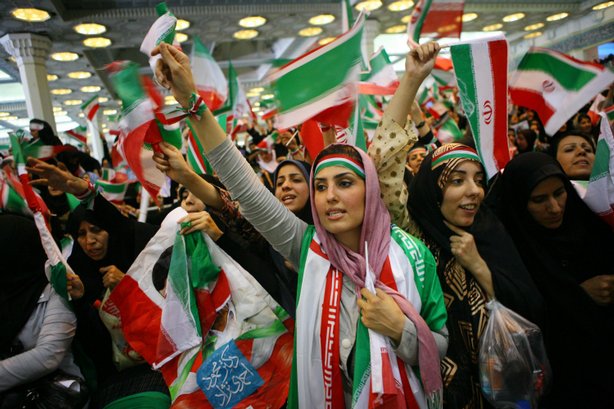
The upcoming presidential elections in Iran is scheduled for June 14, 2013. Iran’s 2009 presidential election was fraught with accusations of fraud and irregularities. While the elections inside Iran received significant international media attention, the results of Iran’s out-of-country voting (external vote) in 2009 did not receive a well-deserved scrutiny. With Iran’s preparations to hold its next presidential election overseas, it is important to highlight some of the voting irregularities and ambiguities pertaining to the country’s out-of-country voting (OCV) program in 2009.
Out-of-country voting is only set up during Iran’s presidential elections and its procedure is largely unregulated. Unlike many countries that employ OCV, Iran does not restrict entitlement to voting based on length of stay abroad or reason for staying abroad, and there is no registration requirements for ex-patriot voters. Furthermore, the legal framework contains no distinct rules for external voters. As an example, according to news reports, in 2009, external voters in many locations were allowed to produce a passport in lieu of a birth certificate or national identity card as was required in in-country voting. Additionally, Iran’s Presidential Election Law, related by-laws and administrative decrees promulgate the procedures, eligibility requirements, and rights and responsibilities for participation in Presidential Elections. Also, it is worth noting that many OCV procedures are determined by administrative decrees or by procedural directives that are inaccessible to the public.
Vagaries related to OCV extend to counting and reporting requirements as well. There was no available information in 2009 on how OCV votes were to be tallied and whether the counting process was to be observed by political parties. The data related to Iran’s presidential election results in 2009, which was subsequently removed from the website of Iran’s Interior Ministry (MOI) following the post-election turmoil, was proved incomplete. Iran’s Press TV report, which directly reported the MOI data, only listed results of 95 countries or territories where OCV was administered while other press reports indicated that polling was to take place in 130 countries or territories. Because of discrepancies and reporting deficiencies, it is not clear how many total votes were cast abroad. Figures range from 234,812 votes (Press TV claiming to report Ministry of Interior figures) to 372,225 (calculations made by AEI based on the Press TV data). Additionally, in a number of countries (such as the United States, Turkey, Iraq, and the United Arab Emirates among others), press reports indicated that there were multiple polling locations, but results were only reported in one city. In the United States, it is clear that polling occurred in at least 31 locations and that tens of thousands of Iranians voted. Results, however, were only released from ballots in New York.
Spoiled ballots also proved problematic. The Interior Ministry reported zero spoiled ballots for all polling locations except in Lahore in Pakistan. There were, however, many cases in which there was a discrepancy between the summed total of votes cast for each candidate. In Canberra, Australia, for example, the summoned total of votes cast for each candidate exceeded the reported number of total votes. These discrepancies could imply that there were indeed spoiled ballots in multiple locations. It is not clear why this data was not included in the MOI report.
Reporting from mobile ballot boxes was also a cause for concern. Only results for mobile ballot boxes positioned in five countries were reported by the Interior Ministry. This included one ballot box in Kazakhstan, one in Cyprus, one in Hyderabad in India, two in Lebanon and one in Ukraine. Iranian press, however, reported in 2009 that 13 mobile ballot boxes were to be used in at least five other countries including Malaysia, Japan, Syria, Iraq, and Oman. Results for these mobile ballot boxes were never released by the Iranian Interior Ministry.
The Iranian Interior Ministry reported in 2009 that Iranian expatriates elected Mir-Hossein Mousavi, as president, and Mousavi won 111,792 votes compared to Ahmadinejad with 78,300 votes. It was reported, however, that Iranians inside Iran elected the incumbent president, Mahmoud Ahmadinejad, for a second term in office. Many Iranians inside and outside the country called for vote-recount. When those calls were not heeded to by Iranian officials, extensive protests took place around the country and the world by Iranian citizens and expatriates.
Majles, the Iranian parliament, recently embarked on a plan to possibly stymie any chance that an ally of Ahmadinejad might be elected as president in June 2013. Fifty Iranian parliamentarians recently presented a plan to the Majles Commission on Councils and Interior Affairs. The plan advocates the creation of a high council entitled the “National Elections Council”. The council would comprise 11 high-ranking Iranian officials to administer elections, a role seen by Ahmadinejad and his government as the sole responsibility of Iran’s Ministry of the Interior under the Iranian constitution. The new proposal is also seen by many as a new gesture to win the confidence of Iranian voters inside and outside of the country during the upcoming presidential election and repair the country’s damaged international image. However, the amendment to the election law, if approved, could also be viewed by many as an acknowledgement of the Iranian law-makers and senior decision-makers that election fraud did in fact take place in the 2009 elections. It is unclear if this plan will be approved in time for the elections in 2013 and if it will mitigate problems with the OCV process. Only time will tell if Iran will be able to avert the irregularities that plagued OCV voting in 2009.